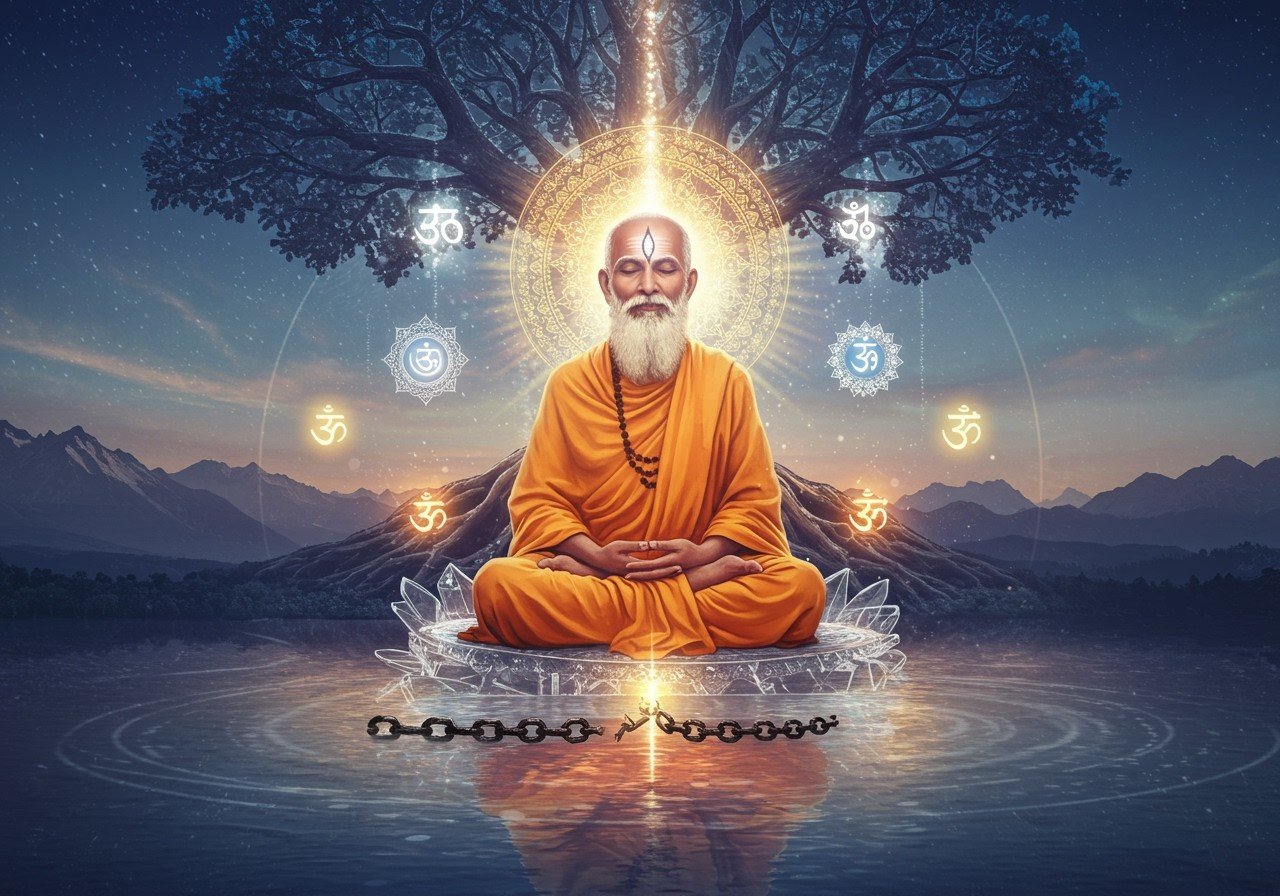
Jnana Yoga, a significant path in Hindu philosophy, is known as the yoga of knowledge and wisdom. It offers a profound spiritual journey centered on understanding rather than physical postures. For those who value tradition and seek authentic spiritual experiences, Jnana Yoga provides a meaningful path to deeper understanding. With the convenience of online resources, exploring this path is now more accessible and enriching.
Understanding Jnana Yoga
Jnana Yoga, meaning “the path of knowledge” in Sanskrit, emphasizes self-realization through understanding the self and the universe. Foundational texts like the Upanishads and the Bhagavad Gita guide practitioners toward wisdom and enlightenment through the pursuit of knowledge. These scriptures offer profound insights into the nature of reality and the self.
Delve deeper into the wisdom of the Bhagavad Gita with our insightful blog post.
The Goal of Jnana Yoga
The primary aim of Jnana Yoga is Moksha, liberation from the cycle of birth and death. Practitioners strive to overcome ignorance (Avidya) and realize their true nature (Atman) as one with Brahman, the ultimate reality. Understanding the concept of non-duality (Advaita), where the individual soul and universal soul are seen as unified, is a core principle. Explore the ancient wisdom of the Vedas for practical applications in modern life.
Key Practices and Techniques of Jnana Yoga
Jnana Yoga involves distinct stages of learning and practice:
- Sravana (Listening): This initial stage involves attentively listening to the teachings of wise gurus and studying sacred texts. It forms the foundation for understanding the core principles of Jnana Yoga. Active listening is crucial for absorbing the wisdom imparted.
- Manana (Reflection): After listening, practitioners engage in deep reflection on the teachings. This involves contemplating the meaning and implications of the knowledge received, seeking to internalize its wisdom. This stage helps in clarifying doubts and solidifying understanding.
- Nididhyasana (Deep Meditation): The final stage involves profound meditation on the truths revealed through listening and reflection. This meditative practice aims to realize the truth directly through experience, leading to self-realization. Consistent and dedicated meditation is essential for this transformative process.
The Guru-disciple relationship is essential in guiding practitioners through these stages. These combined practices facilitate the dissolution of the ego and the removal of ignorance, ultimately leading to the realization of truth and liberation.
Discover practical guidance on meditation for children and cultivate mindfulness in young minds.
The Focus of Jnana Yoga
Jnana Yoga centers on introspection and self-inquiry through “Neti Neti” (“not this, not that”), a method of understanding the self by eliminating false identities. Cultivating discrimination (Viveka) and dispassion (Vairagya) enables practitioners to distinguish between the real and the unreal, facilitating spiritual growth and discernment. Learn how to cultivate present moment awareness through mindfulness meditation.
The Importance of Jnana Yoga in Today’s World
Jnana Yoga holds significant relevance for those seeking understanding beyond the material realm. By fostering direct understanding of the self and reality, it cultivates inner peace, clarity, and purpose. In today’s fast-paced world, it provides a refuge for personal growth, self-discovery, and enlightenment, making it highly relevant for contemporary seekers. Discover the power of repeating sacred names (Japa) and deepen your spiritual practice.
Jnana Yoga: A Path to Enlightenment
- Liberation from Illusions (Maya): Jnana Yoga encourages practitioners to transcend Maya, the illusions of the material world, by recognizing the limitations of sensory perceptions and cultivating a deeper understanding of reality. This involves shedding limiting thoughts and perceptions that obscure the true essence of existence. By understanding that our senses can mislead us, practitioners seek liberation from these falsehoods.
- Self-Realization: The path of Jnana Yoga is a deeply personal journey of self-discovery. It involves moving beyond the ego and surface-level thoughts to uncover one’s true nature. This process helps distinguish between the real and unreal, leading to a profound understanding of one’s identity beyond worldly attachments. Through self-realization, individuals understand their inherent connection to the divine.
- Union with Brahman: Central to Jnana Yoga is the realization of the oneness of the inner self (Atman) with Brahman, the ultimate reality. This realization cultivates a deep connection with the universe, fostering profound peace and understanding. Practitioners strive for this union, experiencing the interconnectedness of all things.
- Detachment from Ego: Jnana Yoga emphasizes detaching from the ego, not as a loss of self, but as a path to greater strength and purity. By recognizing the ego as distinct from the true self, individuals move closer to spiritual purity. This detachment allows for a clearer perception of reality, unburdened by the ego’s limitations.
- Removing Ignorance (Avidya): The practice of Jnana Yoga involves employing discernment, self-inquiry, and contemplation to remove ignorance (Avidya). This process requires dedication and a sincere pursuit of the highest knowledge, leading to clarity, wisdom, and spiritual awakening. By removing the veil of ignorance, practitioners gain access to true knowledge.
How Poojn.in Supports Your Jnana Yoga Journey
Poojn.in offers a curated selection of items to support your Jnana Yoga and meditation practice. Our collection includes meditation accessories and spiritual books to deepen your understanding of the path of knowledge and self-realization.
For focused meditation sessions, we offer:
- Pure copper water vessels for storing energized water
- Traditional meditation mats (asanas) made from kusha grass Explore our collection of meditation mats.
- Brass and copper incense holders for creating a peaceful atmosphere Enhance your meditation space with our incense holders.
To enhance your spiritual knowledge, we offer:
- Vedantic texts and scriptures
- Books on Jnana Yoga philosophy
- Spiritual literature from renowned scholars
Our meditation aids include:
- Natural incense sticks for meditation Find the perfect incense for your practice.
- Pure ghee diya lamps for concentration
- Crystal malas for counting meditation rounds Browse our selection of malas.
Visit Poojn.in to explore our complete range of authentic meditation and spiritual items. We deliver across India with secure packaging and reliable shipping. All products are verified for authenticity and quality to support your spiritual journey effectively.
Embracing the Journey of Jnana Yoga
Jnana Yoga serves as a timeless guide toward spiritual awakening and self-discovery. By shedding illusions and embracing truth, practitioners embark on a meaningful journey of transformation. This path is not merely about understanding the universe but about connecting deeply with our true selves. As we detach from the ego and embrace wisdom, we discover profound peace and clarity. For those who value tradition and seek authentic spiritual growth, Jnana Yoga offers a profound and transformative experience. With readily available online resources, this journey is more accessible than ever, allowing for exploration and growth from the comfort of your home.
FAQs on Jnana Yoga’s Goal: A Clear Explanation
What is the main goal of Jnana Yoga? Jnana Yoga’s primary aim is to achieve self-realization and enlightenment by seeking true knowledge and understanding of one’s identity and connection with the universe. This involves transcending the limitations of the ego and realizing the true nature of reality.
How does Jnana Yoga focus on knowledge? Jnana Yoga emphasizes knowledge through deep contemplation, study of sacred texts, and introspective meditation. It encourages practitioners to question, reflect, and inquire into their own nature and the nature of the world around them. This pursuit of knowledge leads to wisdom and self-awareness.
Why is Jnana Yoga important? Jnana Yoga is important because it facilitates a deeper understanding of oneself and one’s purpose in life. It promotes wisdom, clarity of thought, and spiritual growth, leading to a more meaningful and fulfilling existence. By understanding the true nature of reality, individuals can find liberation from suffering.
What are the key practices in Jnana Yoga? Key practices in Jnana Yoga include self-inquiry (Neti Neti), meditation, and the study of sacred texts. These practices aim to dispel ignorance (Avidya) and reveal the truth of one’s existence. They work synergistically to cultivate self-awareness and wisdom.
Can anyone practice Jnana Yoga? Anyone with a sincere desire for truth, self-understanding, and spiritual growth can practice Jnana Yoga. It demands dedication, patience, and a willingness to explore the depths of one’s mind and soul. The path is open to all who seek true knowledge.
How does Jnana Yoga differ from other types of yoga? Jnana Yoga distinguishes itself from other yoga paths by primarily focusing on knowledge and wisdom rather than physical postures (Hatha Yoga) or devotion (Bhakti Yoga). It emphasizes the intellect and the transformative journey towards enlightenment through self-realization.
What role does meditation play in Jnana Yoga? Meditation holds a crucial role in Jnana Yoga. It serves to quiet the mind, allowing practitioners to focus on introspection, cultivate deeper self-awareness, and gain insights into their true nature. Through consistent meditation, the veil of ignorance is gradually lifted, revealing the true self.


